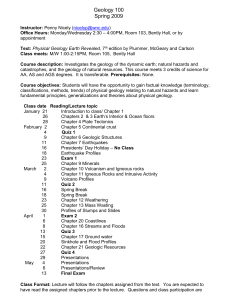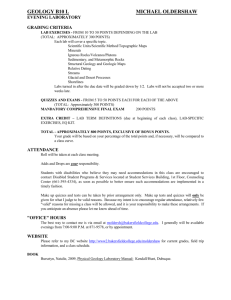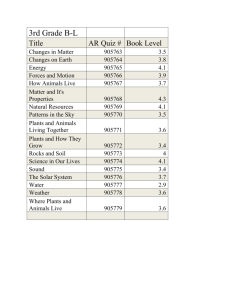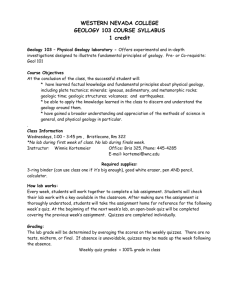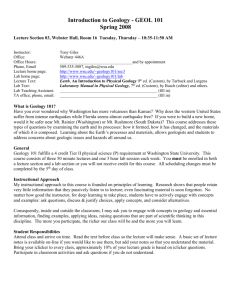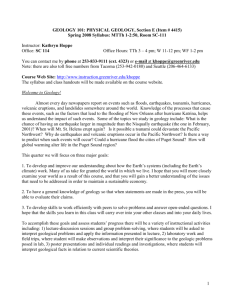Santiago Canyon College Tentative Introduction to Geology 101
advertisement
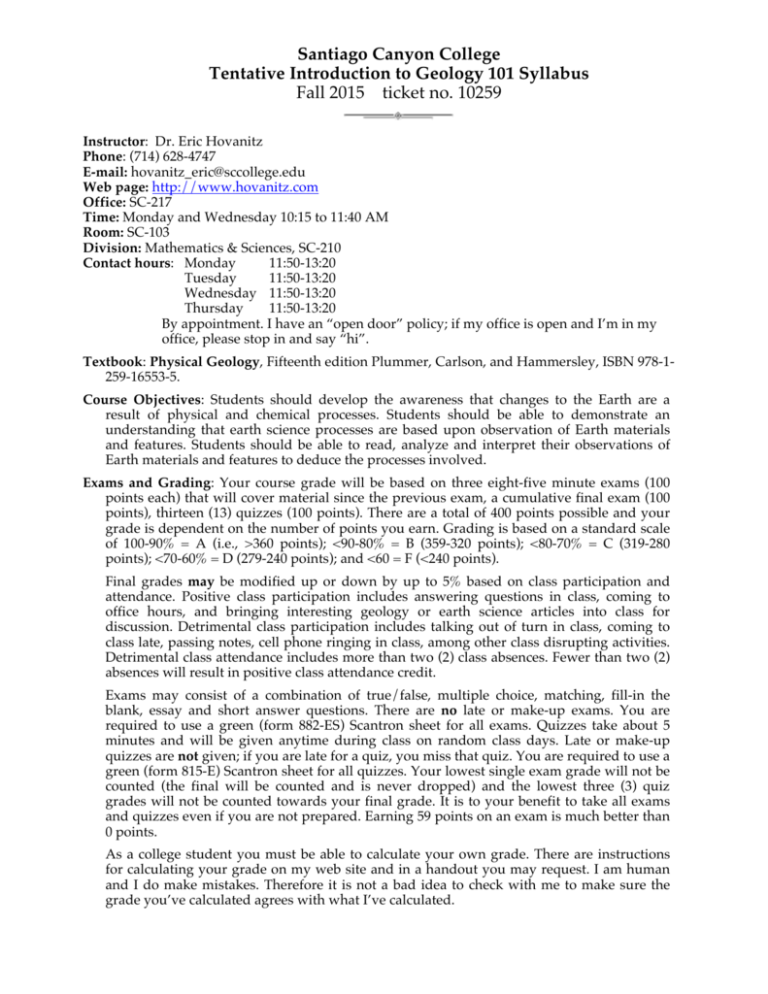
Santiago Canyon College Tentative Introduction to Geology 101 Syllabus Fall 2015 ticket no. 10259 Instructor: Dr. Eric Hovanitz Phone: (714) 628-4747 E-mail: hovanitz_eric@sccollege.edu Web page: http://www.hovanitz.com Office: SC-217 Time: Monday and Wednesday 10:15 to 11:40 AM Room: SC-103 Division: Mathematics & Sciences, SC-210 Contact hours: Monday 11:50-13:20 Tuesday 11:50-13:20 Wednesday 11:50-13:20 Thursday 11:50-13:20 By appointment. I have an “open door” policy; if my office is open and I’m in my office, please stop in and say “hi”. Textbook: Physical Geology, Fifteenth edition Plummer, Carlson, and Hammersley, ISBN 978-1259-16553-5. Course Objectives: Students should develop the awareness that changes to the Earth are a result of physical and chemical processes. Students should be able to demonstrate an understanding that earth science processes are based upon observation of Earth materials and features. Students should be able to read, analyze and interpret their observations of Earth materials and features to deduce the processes involved. Exams and Grading: Your course grade will be based on three eight-five minute exams (100 points each) that will cover material since the previous exam, a cumulative final exam (100 points), thirteen (13) quizzes (100 points). There are a total of 400 points possible and your grade is dependent on the number of points you earn. Grading is based on a standard scale of 100-90% = A (i.e., >360 points); <90-80% = B (359-320 points); <80-70% = C (319-280 points); <70-60% = D (279-240 points); and <60 = F (<240 points). Final grades may be modified up or down by up to 5% based on class participation and attendance. Positive class participation includes answering questions in class, coming to office hours, and bringing interesting geology or earth science articles into class for discussion. Detrimental class participation includes talking out of turn in class, coming to class late, passing notes, cell phone ringing in class, among other class disrupting activities. Detrimental class attendance includes more than two (2) class absences. Fewer than two (2) absences will result in positive class attendance credit. Exams may consist of a combination of true/false, multiple choice, matching, fill-in the blank, essay and short answer questions. There are no late or make-up exams. You are required to use a green (form 882-ES) Scantron sheet for all exams. Quizzes take about 5 minutes and will be given anytime during class on random class days. Late or make-up quizzes are not given; if you are late for a quiz, you miss that quiz. You are required to use a green (form 815-E) Scantron sheet for all quizzes. Your lowest single exam grade will not be counted (the final will be counted and is never dropped) and the lowest three (3) quiz grades will not be counted towards your final grade. It is to your benefit to take all exams and quizzes even if you are not prepared. Earning 59 points on an exam is much better than 0 points. As a college student you must be able to calculate your own grade. There are instructions for calculating your grade on my web site and in a handout you may request. I am human and I do make mistakes. Therefore it is not a bad idea to check with me to make sure the grade you’ve calculated agrees with what I’ve calculated. All quizzes and exams must be completed in pencil. Pen is not allowed. If you change your mind about something you need to erase it. It is very difficult and time consuming to read cross-outs in pen, so I can’t do it in fairness to your fellow classmates who follow the rules. Many students incorrectly believe that many questions are “tricky” or “trick” (poor English.) I never intentionally make a question “tricky”. Student examples of “tricky” questions include misreading “million” for “billion” or “knowing” something that another teacher may have told you that is incorrect like “the mass of an electron is zero”. It is important to read all instructions before beginning a quiz or exam. On exam matching questions, the instructions will state that an answer may be used once, never, or multiple times. This means that an answer may be used 1, 2, 3, 4, or even more times. Do not cross out a possible answer because it has already been used (frequently considered by students to be “tricky”). Real life doesn’t eliminate an answer once you’ve used it and neither should an exam. If you need a grade card signed for athletics, parole officer, scholarship or some other requirement please visit my office before or after class for a grade card signature. These days I’m too old to remember everyone’s grades so please do not ask me in the classroom what your grade is. I won’t know. In addition please don’t ask me to say you are earning a grade better than what you really have earned. That would be lying and could subject me to legal prosecution. A quiz or exam begins when the first quiz or exam is passed out. After a quiz or exam has begun, there can be no talking or other forms of communication between students without your professor’s explicit permission. This includes asking another student for a Scantron. Once an exam begins there will be no restroom breaks. You must use the restroom before the exam begins. Attendance: School policy states that you may be dropped from this class if you have three (3) absences. Do Not drop a class by stopping attendance. You will likely end up receiving an “F” if you do so. If you intend to drop, please complete the formal drop procedure through the Admissions Office or online. Do not miss a single class meeting for the first two weeks or you may be dropped. Cheating: Cheating is not tolerated. SCC policy for cheating and dishonesty is located at: https://www.sccollege.edu/studentservices/admissions/documents/others/collegepolicies.pdf These policies will be enforced to the greatest extent allowed. Please don’t cheat. Student Conduct: All students are responsible for maintaining appropriate conduct while enrolled in classes through the Rancho Santiago Community College District (RSCCD). Guidelines for student conduct are set forth in the RSCCD “Standards of Student Conduct” policy. Detailed information regarding student discipline and rights within this policy is available in the college catalog and student handbook. Students who violate the Standards of Conduct are subject to disciplinary action which includes, but is not limited to, removal from class, suspension and expulsion. This is a college class. Therefore you need to act like college students. There is no talking in class, no passing notes, no cell phone use in the classroom, and nothing that might be disruptive to the class. You must turn phones off before entering the classroom. Cell phone must be off whenever you are in class; even during breaks. Cell phone may be turned on again when you leave the classroom. Any violations of class etiquette, such as cell phone noise of any sort, incur massive negative class participation points. Recording: Audio, video, or photographic recording of anything inside SC-103 is expressly prohibited without prior written permission from your instructor. Accommodations for Disabilities: Students with disabilities who want to request academic accommodations are responsible for informing their instructors and Disabled Students Programs and Services (DSPS) as early in the semester as possible, or at least two weeks before the accommodation is needed. To have accommodations authorized, students must provide DSPS with verification of disability and meet with a DSPS professional for an evaluation of needs. Students may schedule a DSPS appointment by coming to the DSPS Office in E-105, by phoning us at (714) 628-4860 or by emailing us at DSPS@sccollege.edu. Tentative Class Schedule Week 1 2 3 4 5 6 7 8 9 10 11 12 13 14 15 16 Dates 08.24.2015 08.26.2015 08.31.2015 09.02.2015 09.07.2015 09.09.2015 09.14.2015 09.16.2015 09.21.2015 09.23.2015 09.28.2015 09.30.2015 10.05.2015 10.07.2015 10.12.2015 10.14.2015 10.19.2015 10.21.2015 10.26.2015 10.28.2015 11.02.2015 11.04.2015 11.09.2015 11.11.2015 11.16.2015 11.18.2015 11.23.2015 11.25.2015 11.30.2015 12.02.2015 12.07.2015 12.09.2015 Lecture Topic Assigned Readings Introduction, Introducing Geology Chapter 1 Introduction, Introducing Geology Chapter 1 Atoms, Elements, and Minerals Chapter 2 Atoms, Elements, and Minerals (Deadline: last refund drop day) Chapter 2 Labor Day Holiday – No class! Igneous Rocks, The Origin and Evolution of Magma . . . Chapter 3 Igneous Rocks, The Origin and Evolution of Magma . . . Chapter 3 Volcanism and Extrusive Rocks Chapter 4 Volcanism and Extrusive Rocks Chapter 4 Exam #1 Chapters 1-4 Weathering and Soil (Deadline: graduation petition) Chapter 5 Sediment and Sedimentary Rocks Chapter 6 Sediment and Sedimentary Rocks Chapter 6 Metamorphism and Metamorphic Rocks Chapter 7 Time and Geology Chapter 8 Time and Geology Chapter 8 Mass Wasting Chapter 9 Streams and Floods Chapter 10 Groundwater Chapter 11 Exam #2 Chapters 5-11 Glaciers and Glaciation (Daylight Savings Time) Chapter 12 Deserts and Wind Action Chapter 13 Geologic Structures Chapter 14 Veterans Day Holiday – No Class! (Last day to drop class with “W”) Earthquakes Chapter 15 Earthqaukes Chapter 15 Earth’s Interior and Geophysical Properties Chapter 16 Exam #3 Chapters 12-16 Plate Tectonics—The Unifying Theory Chapter 17 Plate Tectonics—The Unifying Theory Chapter 17 Waves, Beaches and Coasts Chapter 14 Cumulative Final Exam—10:15-11:40 (Bring Brain) “The Book” Please read assigned chapters before coming to class. Quiz’s may contain material you should read before class.
